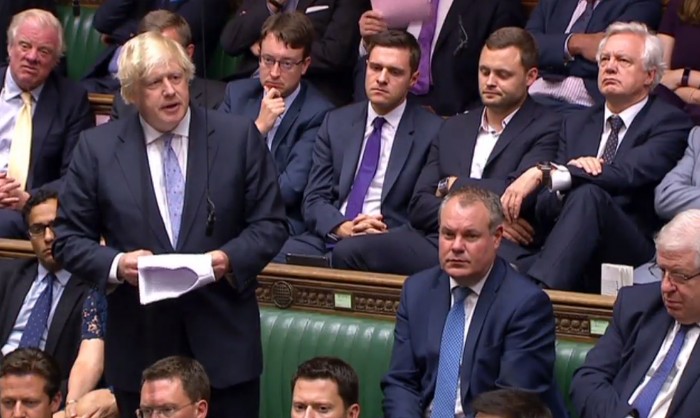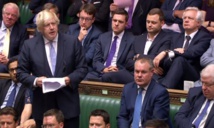In a resignation letter to Johnson published via Twitter, Lee accused the government of "using political manipulation, bullying and lies."
Lawmakers are expected to vote late Tuesday on a cross-party motion that would require Johnson to ask the European Union to delay Brexit until January 31, unless parliament approves a new deal or votes in favour of a no-deal Brexit by October 19.
Lee's resignation further reduced Johnson's chances of winning the vote, amid expectation that a dozen or more Conservatives will back the motion to require him to seek an extension until January.
But a defiant Johnson told lawmakers that he will "never surrender" by seeking a further delay to Brexit.
"I will never surrender the control of our negotiations in the way the leader of the opposition is demanding," Johnson told parliament, after opposition Labour leader Jeremy Corbyn backed the motion.
Johnson accused supporters of the bill of wanting to "frustrate the will of the people" and "overturn the result of the [2016 Brexit] referendum."
About 15 Conservatives, including former chancellor of the exchequer Philip Hammond, plan to oppose the government by backing the cross-party bill in parliament's elected main house, the Commons, the BBC and other media reported.
If successful, the bill would force Johnson to ask the European Union to delay Brexit until January 31, unless lawmakers approve a new deal or vote in favour of a no-deal Brexit by October 19.
Government sources said Johnson will ask parliament to approve a snap general election for October 14 if he loses the vote on blocking a no-deal Brexit.
If he calls for a general election, Johnson will need the backing of two-thirds of the 650 lawmakers, making Labour's stance crucial.
Shami Chakrabarti, Labour's shadow attorney general, told the BBC that her party wants to "ensure that we get this legislation [preventing a no-deal Brexit] locked down" before committing itself to an election.
Liberal Democrat lawmaker Layla Moran also said an immediate parliamentary vote for a snap election would be "obviously a trap" because Johnson would be able to set the election date to help him ensure Britain leaves the EU on October 31.
Johnson told parliament that that the chances of a deal with Brussels "have risen" in recent weeks.
"This week we are intensifying the pace of meetings in Brussels," he added. "Our European friends can see that we want an agreement."
But the European Commission cast doubt on Johnson's report of progress in the talks.
Spokeswoman Mina Andreeva said the EU's executive now considers it a "very distinct possibility" that Britain will leave the bloc without a transitional deal.
"At this stage ... I can't report any concrete proposals having been made that we have seen," Andreeva said.
-------------------------------------------------------------------------------------------









 Home
Home Politics
Politics











